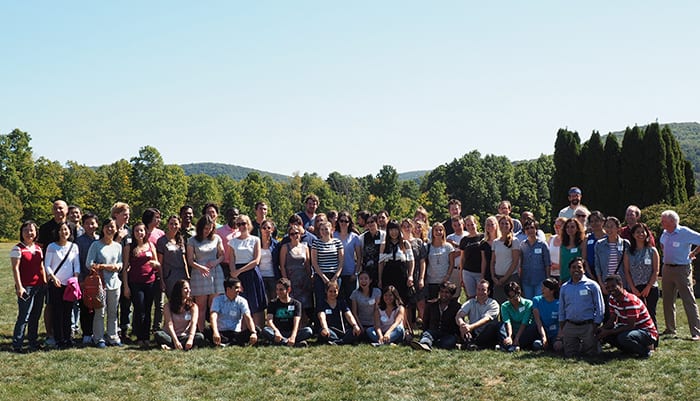News
2016 BTI Science Symposium: The Future of Plants in a Changing Environment

Faculty and staff attendees of the 2016 BTI Science Symposium.
In the face of climate change, understanding how plants and crops respond to stress grows ever more important. The Postgraduate Society (PGS) at the Boyce Thompson Institute (BTI) chose “Plant adaptations to biotic and abiotic stresses” as the theme for the 2016 BTI Science Symposium. The event, held Sept. 22 at Celebrations in Ithaca, included talks along this theme from researchers at Cornell University and BTI, a poster session and a guided wine tasting. The Symposium offers BTI faculty, staff and students the opportunity to exchange ideas and to learn more about the work of their colleagues.
“We’re going to be looking at root physiology, drought and changing climate, plant breeding and vector-pathogen interactions,” said graduate student Penelope Lindsay, co-chair of PGS, in her opening remarks. “It’s really important to consider all of these different perspectives when we’re seeing a changing environment over time, a burgeoning population and increased agricultural demands.”
The scientific programming spanned multiple sections of plant science, including molecular biology, atmospheric sciences, plant breeding and soil and crop sciences. The program began with a talk by Ed Buckler, a USDA Agricultural Research Service Research Geneticist and professor of Plant Breeding and Genetics at Cornell, on the identification of harmful genetic variations in maize for better corn breeding, followed by Toby Ault, an assistant professor of Earth and Atmospheric Sciences at Cornell who spoke about historical multi-decade-long “megadroughts” in the American Southwest and his predictions for more frequent, intense, and prolonged megadroughts in the future.
After lunch, Taryn Bauerle, associate professor of Horticulture at Cornell, described her work using electrical signals given off by sunflowers and a forest-level study of trees in a German forest to understand how plants respond to water stress. Finally, Michelle Cilia, a Research Molecular Biologist at the USDA Molecular Research Service and assistant professor at BTI presented her latest work on citrus greening disease, a bacterial disease spread by the Asian citrus psyllid, which is having a devastating effect on the U.S. citrus industry.
During the poster session, 30 postdoctoral scientists, research associates and graduate students from across the institute presented their work. A panel of BTI judges selected visiting scholar Anquan Wang and postdoctoral scientist Pavan Kumar as the winners for best posters.
The day’s events concluded with a talk by Gavin Sacks, associate professor of Food Science at Cornell, on the chemistry of terroir in wines, which was accompanied by a tasting of demonstration wines.
The Symposium is the high point of a year of activities organized by PGS. Armando Bravo, Lidia Campos-Soriano, Penelope Lindsay, Lena Mueller and Coralie Salesse-Smith made up the planning committee. In 2016, PGS also hosted several visiting speakers, an Industry Symposium and other professional development activities.
The next event planned by PGS is a Distinguished Lecturer talk by Professor Liam Dolan of the University of Oxford. Dolan will give a talk entitled “Development and evolution of land plant rooting systems” at 4 pm, Oct. 19th in the BTI auditorium.

